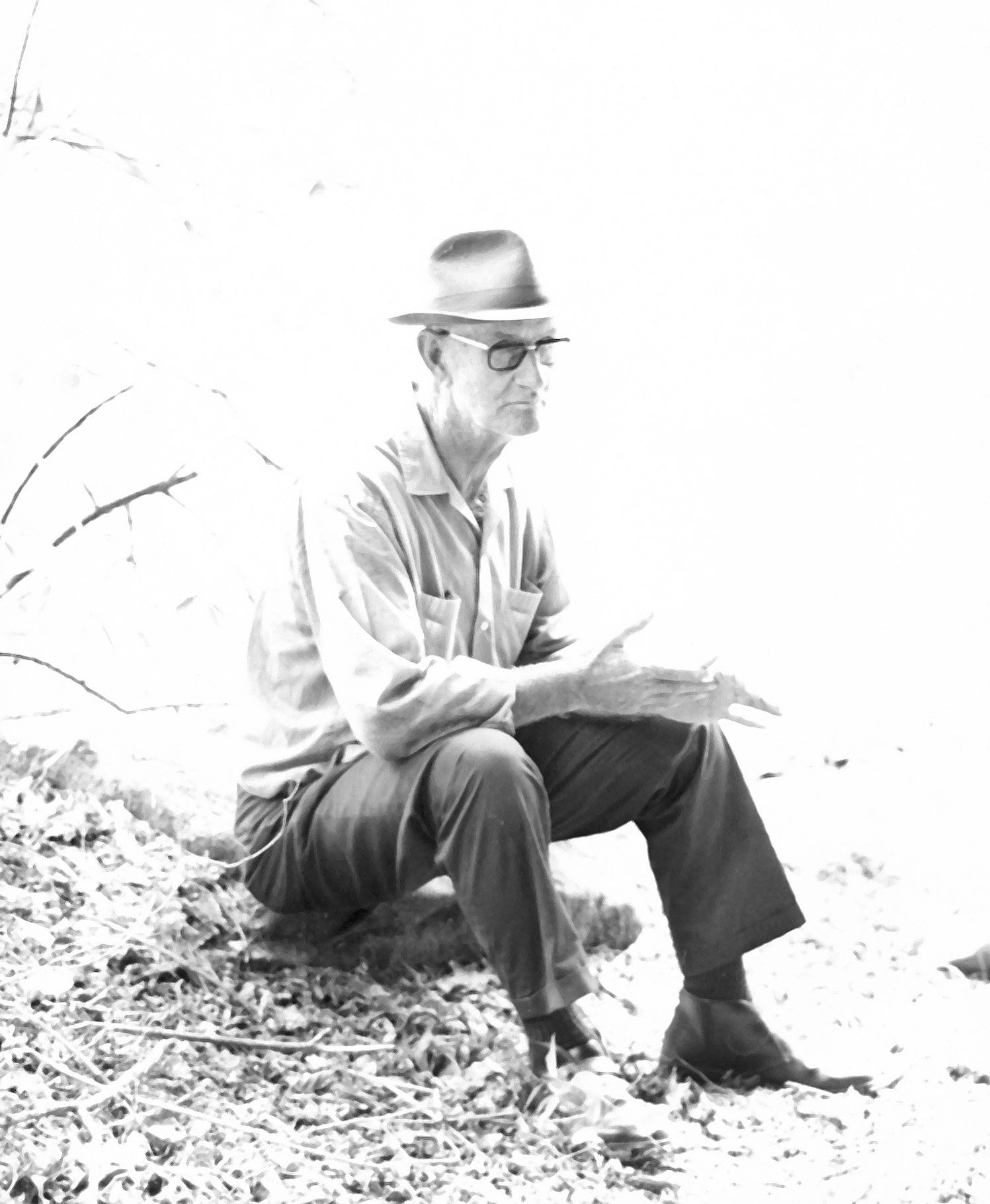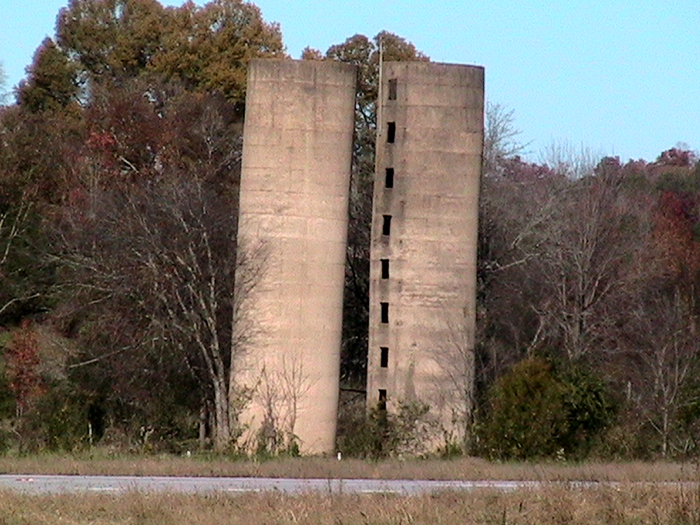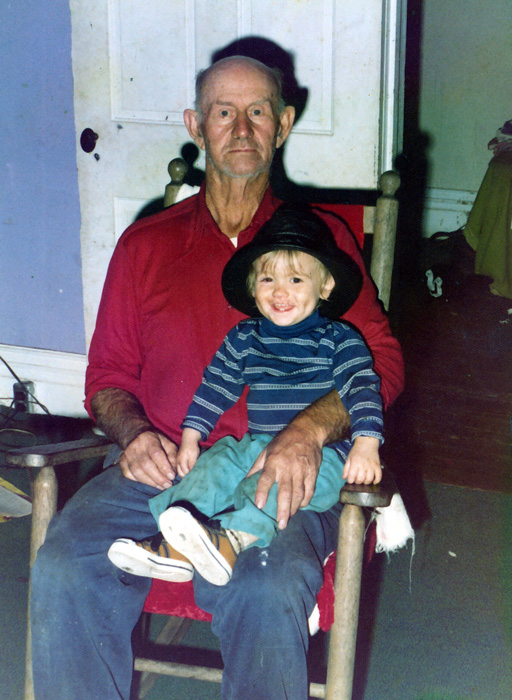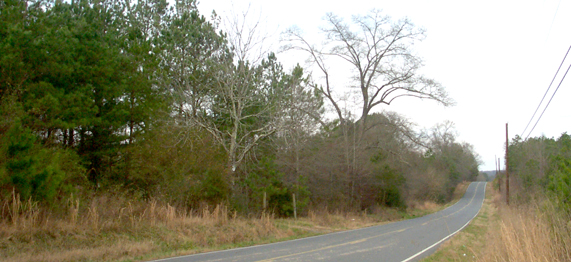 | Papa Hall at a place we called "Big Rock" near Cloudland Canyon, Georgia. We camped under a huge rock overhang, now gone due to a development. This photo was made in the mid-1970s, a few years before he died.
|
Papa stories
“The first time he saw an automobile”
There is a family story about the first time Papa Hall saw an automobile. He was about 10, so it was around 1914. He and several other boys were walking on a road near Reeves Station in the Oostanaula district when they heard the car approach. Scared, the boys climbed a pasture fence and hid behind it until the car passed by.
“The time Papa fell out of the truck”
He and his cousin Grover, his brother Jim’s son, went to Pickens County one winter to work at a sawmill. This was probably in the early 1930s. They were driving an old pickup truck that had no doors, probably a Model T Ford, and the roads were all dirt, so travel was slow.
They left on a Sunday and arrived at the sawmill in the early morning hours on Monday. They worked all day, got paid in cash, and decided go back home. Late that night, tired and without much sleep, they were traveling along a road somewhere near home. Grover was driving and Papa was asleep in the passenger seat.
For whatever reason, Papa fell out of the truck and landed on the side of the road. He woke up, of course, and jumped up only to see Grover and the truck continue on. Papa said he got mad and tromped on down the road after Grover. He found him a short distance ahead, sitting in the truck, which was in a ditch.
When Papa yelled at Grover about leaving him behind, Grover said, “I was asleep, too.”
“The time Papa lived in the woods”
Papa once lived for a brief period in a lean-to in the woods. He was working for a sawmill, and had no place to stay, so he and some other fellows built a “brush arbor” and slept under it. There came a snow, however, and he and the others were forced to seek shelter elsewhere.
“Papa liked his coffee hot”
One day in an old house on Belwood Road in Calhoun, Georgia, when he was in his 70s, one of his granddaughters was heating water on the stove in the kitchen to make him a cup of instant coffee. She came into the living room, and said, “Papa, the water’s boiling.”
He replied, “Let it boil for another minute or two and make me a cup."
“Papa’s sense of humor”
One time Papa, his son Charles and I were in a pickup truck driving down a heavily rutted dirt road to rescue some relatives who were ‘coon hunting and had gotten their truck stuck in the mud. After several jolts due to the ruts, Papa said, “The fellow who made this road was drunk.”
I said, “Why do you say that, Papa?”
He replied, “Because he made the ditches across the road.”
Papa also told me that his brother Sherman often said that “A catfish likes a cat just like a cat likes a catfish.” One day, Papa had heard it too many times, and killed a stray cat. They used the cat for fish bait.
“We didn’t catch a thing,” Papa said.
(I know that this story might seem to make Papa seem cruel, but the modern reader has to realize that, in terms of the time, he was not. He was a farmer, and all animals had to have their use, or they were worthless.)
“The time Papa hooked Satan to a plow”
Satan was a Shetland pony and Papa tried to use him to plow a quarter-acre garden next to the house on Belwood Road in the last year or so of his life. Satan was named after the Lord of Darkness for a reason. He was an ornery cuss. When Papa tried to plow with him, Satan strained mightily in the harness, with the result that he jerked Papa this way and that, which made the rows zig-zagged. His daughter-in-law was watching from the kitchen and became so incensed at Satan that she stormed out of the house, down to the garden, and hit Satan on the nose. The pony was stunned, but in the end did not so easily give up his devilish ways.
Satan had a good side, however. If a small child was riding him, he walked slowly and gently. So, Papa ended up plowing the garden with one of his grandchildren on Satan’s back. However, if the person on his back exceeded a certain weight, Satan’s other side came to the fore. My last memory of the pony is the time Papa’s youngest son, a grown man, tried to ride him. Satan took off like a shot and immediately ran through a narrow gap between a large privet bush and the back of a small chicken house, emerging from the other side without a rider. In all, the ride took just a few seconds. It was one of the funniest things I have ever seen.
 | In 1918, when he was 14-years-old, Papa Hall helped build these two silos on Highway 53. They stand about two-tenths of a mile north of Millers Ferry Road on the west side of the highway. |
Other memories
Papa
also grew chickens at the house on Belwood Road. He had several
varieties: white leghorns, Rhode Island reds, “Hippie” chickens
(cochins), banties, and black Majorcas. I can still see him feeding
them in a fenced in enclosure in front of the chicken house. One of the
white leghorn hens was in pretty bad shape. She was at the bottom of
the pecking order. I took a picture of the Majoricas, a rooster and
hen, in the sun behind the house. In the sunlight, they have a green
cast.
At
14, Papa helped built the old concrete silos on Highway 53 pictured above. He was staying with a family
helping them farm. He got a pair of overalls, a shirt, and a pair of
shoes for a his season’s work, plus room and board.
One
time, he and his youngest son went to town to buy a pitchfork. The
pitchfork was $7. Papa said, “I can’t believe it’s $7. The last one I
bought was $1.” The clerk asked Papa how much he made for working when
he bought that pitchfork. Papa said, “$1.” He then asked, how long did
you work for that dollar. Papa said, “Two days.” That was two 12-hour
days. He then asked his son how much he made and he said he made about
a dollar an hour. Papa bought the pitchfork.
Papa
had a black, narrow brimmed hat that he wore late in life. He would let
no one else wear it except my youngest son. I have a picture of him and
my son sitting in the same room mentioned in reference to his coffee
above. My son, two, is sitting in his lap in a rocking chair grinning
from ear to ear. Papa is sitting upright and stiff, no doubt how he
learned to pose for camera’s in his youth.
 | Papa, very late in his life, allowing his grandson to wear his hat. |
"They ought to shoot old men like me"
Papa
was old, in his 70s, when he and his son Charles and family lived on
Boone Ford Road in Calhoun. Charles's wife had finished fixing supper
and went to find Papa to tell him. She found him on the front porch of
the house, alone, staring out at the earth and sky.
When she told him supper was ready, he said, "They ought to shoot old men like me."
She said later that he was just tired.

On the left, just beyond the driveway marked by the two posts, sat an old farm house with four large oak trees along the road. Only one of them remains, a silhouette against the sky. Because of the trees, the place was known as Four Oaks. Papa and his sons lived in this house in the 1940s and 1950s.
Memories of Four Oaks
For many years, Papa Hall rented a place called “Four Oaks” a couple of miles above Pleasant Valley Church on Mosteller Mill Road. The property belonged to H. M. Veach, who had a cotton gin and mercantile store in Adairsville. Four large oak trees stood in front of the old farm house, hence the name. The last time I was by there, in 2008, only one of the oaks was still standing, another was a tall stump, and the other two, plus the house and the large barn just south of it, were gone. It was a “plantation plain” house with two rooms on the back, a dining room followed by a kitchen. A porch ran alongside the back two rooms, and at the end of it was a large cistern with a smoke house nearby. Papa had a very large, black cast iron and white ceramic wood stove. I have several memories of this place.
1. Eating fresh hot biscuits with “papa syrup” in the dining room. Papa had cooked them and they were excellent. I have long been a biscuit lover and make a mean biscuit myself, but Papa’s are the gold standard. He taught one of his daughter-in-laws how to make them, and she became a master biscuit baker herself. Papa’s were “cat heat” biscuits, as they are called: large and round and thick, browned on top and bottom and soft in the middle. Papa syrup is a combination of water, sugar, and cocoa, heated together and boiled down. It was served with unpasteurized cow butter. Hmmm. Hmmm. I wrote a poem about this, and about love, too (love is like a good biscuit).
HAWK DREAMS
You are the gyre on which, a hawk,
I pirouette, and in the far blue far aloft
see the golden shocks of corn stalks,
wide green rivers opening brown earth,
occasional whitened bones.
You are the days behind my papa's house,
the girl standing in the white chickens
when the sun through the window fell
across the heat of his old wood stove.
You are yellow air, smelling of biscuits.
2. Riding an old gray mare, a real one, a huge draft horse, when I was about seven. I lay down on its back along its spine and with my head at the base of its mane my feet only came to the top of its hips. A sweet, gentle horse.
3. Watching Charles, and his brother still living, kill two harmless snakes with a butter churn. I think we three went to Uncle Joe’s house (Joe Bunch) which was a mile or so north of Four Oaks on Mosteller Mill Road (it stood on the left just at the beginning of a sharp curve to the right and was still standing last time I was there). I think we went to get milk (Joe had a cow). On the way back, we came across the two snakes less than a hundred yards, north of Four Oaks. I remember them well. One was black and the other brown (as I remember it, a rich brown), and they were undoubtedly rat snakes. Both of them seem to have been very long, about five feet, but that could be an exaggeration of youthful perception. Charles ran home and got the churn stick out of the churn and came back and tried to kill them both. I think he succeeded. Bob threw away the churn stick away.
4. My mother, my sister, and I were going from Joe Bunch’s house to Four Oaks. I was small and my mother was carrying my sister. When we got to Dry Creek, it was flooded. It was a natural irony. I don’t remember the trip to Uncle Joe’s, but only the trip back. We had gone for milk. My mother pulled her dress up around her waist and took Ann and the milk across. Then she came back and got me.
5. At Four Oaks in the 1950s, I saw an elderly woman, perhaps Papa's sister Sarah, sitting close to the fire,probably due to a combination of the house's lack of insulation and her poor blood circulation. I think I was there to watch live professional wrestling, which in those days was “Keystone Wrestling” out of New York. Papa had bought the second television in Pleasant Valley, so a lot of people came over to watch it. The television and antenna were bought by Charles with money he had earned from raising cotton. The woman had her dress up to her knees to warm them. Her dress looked like it had been made from flower sacks; it had a floral print. I stepped to the right of her to get near the fire and I saw her shins. They were red, bright red like they were cooked, and the skin was deeply cracked. She had literally cooked her skin trying to stay warm.
The family moved out of Four Oaks when Papa’s oldest son, Bud, got a job working for an egg company in Douglas County in the 1950s, and Papa got a job there later. I think it was the Southeast Empire Egg Company, which Charles and I worked for later. Papa gathered eggs out of several houses twice a day, seven days a week. I remember little of him in that time, but I do remember driving his 1956 Buick. I think it was dark blue. He also owned a Nash Metropolitan.
In his later years, as said, Papa lived with Charles and his family. In 1972, they were living in an old farm house near Folsom that is now used to store hay. My wife at the time and I were staying with them awaiting the birth of our second child. It was December and the temperature got down to 17. We were sleeping in an unheated room in the old house, and her water broke. I just wrapped her up in a quilt and took her to the hospital.
Later, they lived in another old farm house east of Pleasant Valley. Papa had a large garden next to the house. He planted by the “signs” and grew several rows of potatoes. There was a large round spot in the garden in which nothing grew, and Papa said it was because lightning had struck it. We, my wife and I, played canasta with him and other members of the family. One night we had so many people sitting around two long tables put end-to-end that most of us only got to play our cards twice, and some only once.
Papa Hall was, as we all are, a complicated man who was different things to different people. In general, he was beloved by those closest to him, especially in his old age.